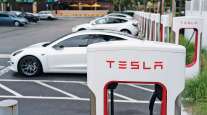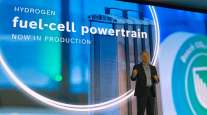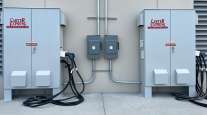Staff Reporter
Administration Officials Tout Future of Electric Vehicles
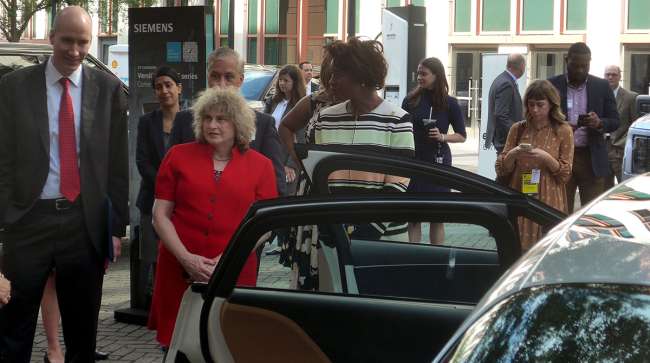
[Stay on top of transportation news: Get TTNews in your inbox.]
A new taskforce to help shape federal policy and guidance for states on electric vehicle charging networks was touted by DOT and DOE leaders as they promoted President Joe Biden’s clean energy plans.
The administration rolled out the red carpet to reporters and stakeholders in a series of events to promote EVs. It started with a virtual press conference June 8 followed the next day with the launch of “Charging Forward: A Two-day Electric Vehicle Symposium.”
Outside DOT headquarters, DOT Deputy Secretary Polly Trottenberg, DOE Deputy Secretary David Turk and Federal Highway Administration Deputy Administrator Stephanie Pollack looked at an array of EV cars, trucks and charging stations before going inside to make brief speeches about their progress to help electrify America’s transportation.
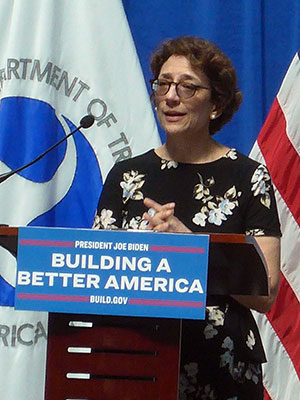
DOT Deputy Secretary Polly Trottenberg (Noël Fletcher/Transport Topics)
Last year, the departments of Transportation and Energy formed a joint office to make Biden’s goal a reality by creating a national network of 500,000 EV chargers.
Main messages from the administration were repeated about how EVs are less costly to run and maintain.
“With today’s gas prices, EV owners can save about $60 every time they charge up compared to an equivalent fossil fuel-powered vehicle,” Energy Secretary Jennifer Granholm said online. “This administration wants to make sure that every American can reap those cost savings, and the key to that mission is giving people confidence that they drive it wherever they want to go and charge it wherever they live, work, shop and play.”
Pollack reiterated key points at both events about the government’s focus to ensure EVs are user friendly, accessible and interoperable among charging companies so customers can expect the same type of experience when recharging. The minimum standards also address having charging stations offer similar payment systems, pricing information and charging speeds.

A Peterbilt 579 EV was on display at the Ev event. (Noël Fletcher/Transport Topics)
“The national EV charging network needs to be truly national, which is why today’s proposal for minimum standards for EV chargers is so important,” she stated. “Put simply, the minimum standards being proposed today will ensure that our EV charging network is a true network, greater than the sum of its parts and not just a loose collection of state networks.”
After viewing the EVs parked outside, Trottenberg spoke about how rewarding it was to see the “handiwork come to fruition” after federal efforts to push forward with EVs.
Transportation officials are working hard to secure America’s electric vehicle future with a national EV charging network for all Americans, thanks to #BipartisanInfrastructureLaw. Check out the press event at the @USDOT HQ this morning: https://t.co/j3gpnZf5OH. #DriveElectric pic.twitter.com/qBSeLIslT3 — Federal Highway Admn (@USDOTFHWA) June 9, 2022
She discussed how input from state and local leaders as well as private sector partners helped form elements in the FHWA’s announcement June 9 about its 82-page notice of rulemaking containing proposed minimum standards and requirements for EV projects funded under the National Electric Vehicle Infrastructure Formula Program.
The proposed rule is expected to publish in the Federal Register within a week. There is a 60-day period for public feedback.
Turk joined the symposium stage to announce the creation of the Federal Advisory Committee Act Electric Vehicle Working Group. It will consist of EV leaders who will work with DOT and DOE to offer recommendations on the development, adoption and integration of EVs.
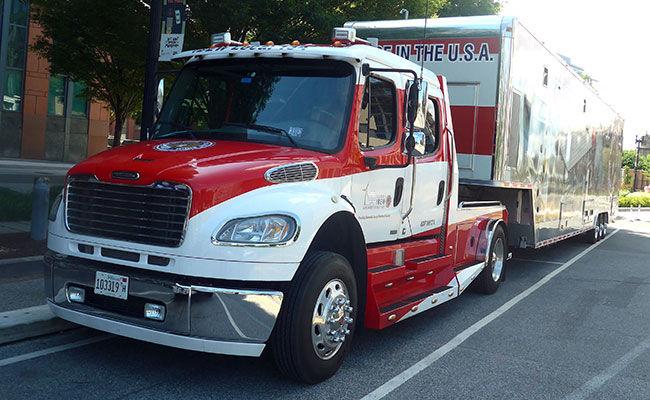
A Freightliner eCascadia was on display at the EV event outside DOT headquarters on June 9. (Noël Fletcher/Transport Topics)
The group will have 25 representatives, federal and special government employees. DOE expects to publish the member nomination process next week.
Turk also revealed that a website called driveelectric.gov has been created for stakeholders and that DOE soon will advance “$30 million to help underserved and overburdened communities to improve their mobility options” to provide them with new tools to expand EV charging capabilities, including offering assistance in getting overnight EV chargers at multiple dwelling units.
Granholm and Turk spoke about the need for Congress to authorize tax credits for EVs and batteries as important incentives to garner greater public acceptance to purchase EVs and lower costs.
Want more news? Listen to today's daily briefing below or go here for more info:


